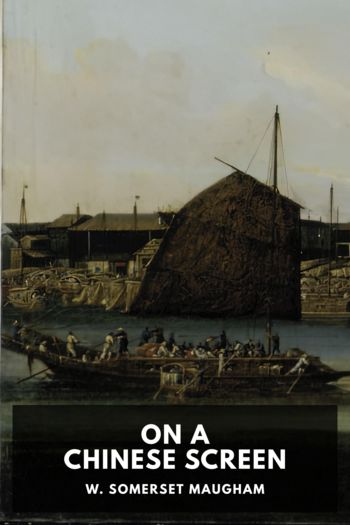Of Human Bondage by W. Somerset Maugham (classic english novels .TXT) 📕

- Author: W. Somerset Maugham
Book online «Of Human Bondage by W. Somerset Maugham (classic english novels .TXT) 📕». Author W. Somerset Maugham
“We’ll get the duffers out of the way first, and then we’ll have a jolly set afterwards.”
Apparently Miss Wilkinson overheard him, for she threw down her racket, and, saying she had a headache, went away. It was plain to everyone that she was offended. Philip was annoyed that she should make the fact public. The set was arranged without her, but presently Mrs. Carey called him.
“Philip, you’ve hurt Emily’s feelings. She’s gone to her room and she’s crying.”
“What about?”
“Oh, something about a duffer’s set. Do go to her, and say you didn’t mean to be unkind, there’s a good boy.”
“All right.”
He knocked at Miss Wilkinson’s door, but receiving no answer went in. He found her lying face downwards on her bed, weeping. He touched her on the shoulder.
“I say, what on earth’s the matter?”
“Leave me alone. I never want to speak to you again.”
“What have I done? I’m awfully sorry if I’ve hurt your feelings. I didn’t mean to. I say, do get up.”
“Oh, I’m so unhappy. How could you be cruel to me? You know I hate that stupid game. I only play because I want to play with you.”
She got up and walked towards the dressing-table, but after a quick look in the glass sank into a chair. She made her handkerchief into a ball and dabbed her eyes with it.
“I’ve given you the greatest thing a woman can give a man—oh, what a fool I was—and you have no gratitude. You must be quite heartless. How could you be so cruel as to torment me by flirting with those vulgar girls. We’ve only got just over a week. Can’t you even give me that?”
Philip stood over her rather sulkily. He thought her behaviour childish. He was vexed with her for having shown her ill-temper before strangers.
“But you know I don’t care twopence about either of the O’Connors. Why on earth should you think I do?”
Miss Wilkinson put away her handkerchief. Her tears had made marks on her powdered face, and her hair was somewhat disarranged. Her white dress did not suit her very well just then. She looked at Philip with hungry, passionate eyes.
“Because you’re twenty and so’s she,” she said hoarsely. “And I’m old.”
Philip reddened and looked away. The anguish of her tone made him feel strangely uneasy. He wished with all his heart that he had never had anything to do with Miss Wilkinson.
“I don’t want to make you unhappy,” he said awkwardly. “You’d better go down and look after your friends. They’ll wonder what has become of you.”
“All right.”
He was glad to leave her.
The quarrel was quickly followed by a reconciliation, but the few days that remained were sometimes irksome to Philip. He wanted to talk of nothing but the future, and the future invariably reduced Miss Wilkinson to tears. At first her weeping affected him, and feeling himself a beast he redoubled his protestations of undying passion; but now it irritated him: it would have been all very well if she had been a girl, but it was silly of a grownup woman to cry so much. She never ceased reminding him that he was under a debt of gratitude to her which he could never repay. He was willing to acknowledge this since she made a point of it, but he did not really know why he should be any more grateful to her than she to him. He was expected to show his sense of obligation in ways which were rather a nuisance: he had been a good deal used to solitude, and it was a necessity to him sometimes; but Miss Wilkinson looked upon it as an unkindness if he was not always at her beck and call. The Miss O’Connors asked them both to tea, and Philip would have liked to go, but Miss Wilkinson said she only had five days more and wanted him entirely to herself. It was flattering, but a bore. Miss Wilkinson told him stories of the exquisite delicacy of Frenchmen when they stood in the same relation to fair ladies as he to Miss Wilkinson. She praised their courtesy, their passion for self-sacrifice, their perfect tact. Miss Wilkinson seemed to want a great deal.
Philip listened to her enumeration of the qualities which must be possessed by the perfect lover, and he could not help feeling a certain satisfaction that she lived in Berlin.
“You will write to me, won’t you? Write to me every day. I want to know everything you’re doing. You must keep nothing from me.”
“I shall be awfully busy” he answered. “I’ll write as often as I can.”
She flung her arms passionately round his neck. He was embarrassed sometimes by the demonstrations of her affection. He would have preferred her to be more passive. It shocked him a little that she should give him so marked a lead: it did not tally altogether with his prepossessions about the modesty of the feminine temperament.
At length the day came on which Miss Wilkinson was to go, and she came down to breakfast, pale and subdued, in a serviceable travelling dress of black and white check. She looked a very competent governess. Philip was silent too, for he did not quite know what to say that would fit the circumstance; and he was terribly afraid that, if he said something flippant, Miss Wilkinson





Comments (0)